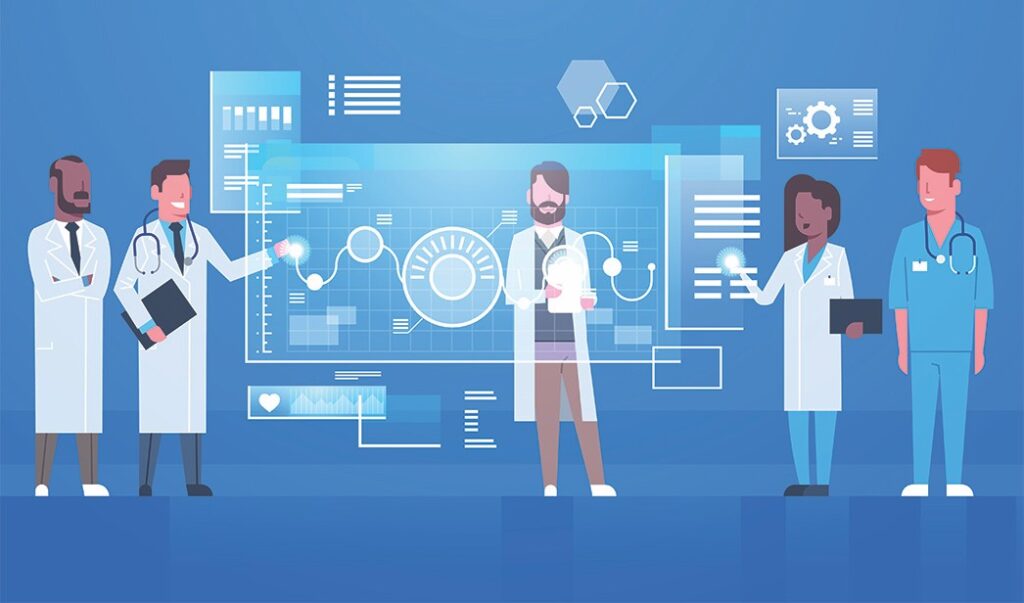How Technology Has Transformed Healthcare – In today’s fast-paced world, technology has become an indispensable part of our lives, revolutionizing various industries, including healthcare. From telemedicine to artificial intelligence, technological advancements have significantly improved patient care, diagnosis, and treatment methods.

Evolution of Technology in Healthcare
Over the years, healthcare has witnessed a remarkable transformation with the integration of technology. Gone are the days of traditional paper-based medical records and lengthy diagnostic procedures. Today, technology has streamlined healthcare processes, making them more efficient and accessible to patients worldwide.
Telemedicine Revolutionizing Patient Care
Telemedicine, the use of telecommunications technology to provide remote healthcare services, has emerged as a game-changer in the healthcare industry. With telemedicine, patients can consult healthcare professionals from the comfort of their homes, eliminating the need for unnecessary trips to the hospital. This not only saves time and money but also improves access to healthcare, especially for individuals in remote or underserved areas.
However, challenges such as internet connectivity issues and regulatory barriers need to be addressed to ensure the widespread adoption of telemedicine.
Electronic Health Records (EHR)
Electronic Health Records (EHR) have replaced traditional paper-based medical records, offering healthcare providers a comprehensive and centralized platform to manage patient information securely. EHR systems enable easy access to patient data, leading to improved coordination of care and better clinical outcomes. Despite the numerous benefits of EHR implementation, concerns regarding patient privacy and data security remain prominent.
Medical Imaging Advancements
Advancements in medical imaging technologies have revolutionized the field of diagnostics, allowing healthcare professionals to visualize and diagnose various medical conditions with greater accuracy and precision. From X-rays to magnetic resonance imaging (MRI) and computed tomography (CT) scans, medical imaging plays a crucial role in early detection and treatment planning, ultimately improving patient outcomes.
Robotics in Surgery
The integration of robotics in surgical procedures has transformed the way surgeries are performed, offering numerous benefits such as enhanced precision, smaller incisions, and faster recovery times. Robotic-assisted surgery allows surgeons to perform complex procedures with greater accuracy and control, minimizing the risk of complications and reducing hospital stays. As technology continues to evolve, the future of robotic surgery holds immense potential for further innovation and advancements in healthcare.
Wearable Health Devices
Wearable health devices, such as fitness trackers and smartwatches, have gained popularity in recent years for their ability to monitor various health metrics in real-time. These devices enable individuals to track their physical activity, heart rate, sleep patterns, and more, empowering them to take proactive steps towards better health and wellness. Despite their potential benefits, challenges related to data accuracy, interoperability, and user privacy need to be addressed for widespread adoption and acceptance.
Artificial Intelligence in Healthcare
Artificial Intelligence (AI) is revolutionizing healthcare by enhancing diagnostic accuracy, personalizing treatment plans, and improving patient outcomes. AI algorithms can analyze vast amounts of medical data, identify patterns, and make predictions that aid in disease detection and management. However, ethical considerations regarding patient consent, data privacy, and algorithm bias need to be carefully addressed to ensure the responsible and ethical use of AI in healthcare.
Conclusion
Technology has significantly transformed the landscape of healthcare, revolutionizing patient care, diagnosis, and treatment methods. From telemedicine to artificial intelligence, the integration of technology has improved access to healthcare services, enhanced diagnostic accuracy, and personalized patient care. As technology continues to evolve, the future of healthcare holds immense promise for further innovation and advancements that will ultimately benefit patients worldwide.
FAQs:
- How has telemedicine impacted healthcare accessibility? Telemedicine has improved healthcare accessibility by allowing patients to consult healthcare professionals remotely, eliminating geographical barriers and increasing access to medical services.
- What are the main advantages of electronic health records? Electronic health records offer numerous advantages, including improved coordination of care, easy access to patient information, and enhanced clinical decision-making.
- How do wearable health devices contribute to preventive healthcare? Wearable health devices enable individuals to monitor their health metrics in real-time, allowing for early detection of potential health issues and proactive management of their well-being.
- What are the key challenges associated with robotic surgery? Challenges associated with robotic surgery include high initial costs, the need for specialized training, and concerns regarding the integration of robotic systems into existing healthcare infrastructure.
- What ethical considerations are important in the use of artificial intelligence in healthcare? Ethical considerations in the use of artificial intelligence in healthcare include patient consent, data privacy, algorithm bias, and ensuring transparency and accountability in decision-making processes.
